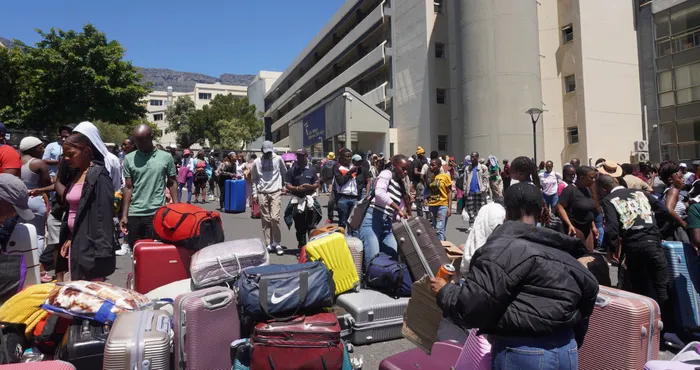
Students protested over the lack of accommodation earlier this year when universities opened.
Image: Ian Landsberg / Independent Newspapers
National Student Financial Aid Scheme (NSFAS) acting chief executive officer, Waseem Carrim, on Wednesday said the entity undertook the student accommodation pilot project without a necessary feasibility study, without an appropriate risk assessment, capacity building policy guideline or legal framework.
This emerged when Nsfas provided an update to the portfolio committee on higher education and training regarding student accommodation challenges.
Carrim said there are three levels of accommodation: on-campus institution-owned and managed accommodation, private accredited student accommodation and private unaccredited accommodation.
For the 2025 academic year, NSFAS had accredited about 326 000 beds, received about 152 000 applications and about 126 000 students have been onboarded in that process. They paid 3800 extra accommodation providers representing over 100 000 students. To date, the disbursements are about R1.3 billion.
“If we reflect on the challenges with student accommodation, NSFAS undertook the student accommodation pilot project without a necessary feasibility study, without an appropriate risk assessment, capacity building policy guideline or legal framework,” Carrim said.
“We would like the function to go back to institutions, but we have to do it in a way that’s fair, equitable and transparent, that doesn't seem to be just shifting the problem from NSFAS to institutions. We come up with a solution that resolves the ongoing challenges for the long term,” Carrim explained.
To resolve challenges, Carrim said they are creating an internal dispute resolution mechanism so landlords and students do not feel like they always need to go outside of the institution.
“With student accommodation, right now, we seem to be in a firefighting mode as we try to resolve the issue. So as far as possible, we are working on every single complaint that we receive to be able to assist individuals in resolving those issues,” Carrim said.
Carrim said they have to confirm that the students who are staying in those residences are indeed students.
“We are picking up too many instances where students are living in accommodation as NSFAS students, but we don't have registration data,” Carrim said.
In terms of the way forward, Carrim said that from April 1, the function was reallocated out of the corporate services unit and placed under the CEO’s office, which was a decision taken under administration, to drive the ministerial directive on student accommodation.
“We have appointed ENS Africa which is undertaking a comprehensive legal review of the student accommodation pilot project that can provide a way forward on NSFAS’s roles and responsibilities in terms of legislation, primarily the NSFAS Act, as well as reviewing all of the contractual agreements entered into with the solution partners and accreditation partners,” Carrim said.
He said they will meet with relevant stakeholders in May for the development of the transitional framework for the handover of student accommodation back to institutions by the end of the 2026 academic year.
Among other issues, Carrim said NSFAS received over a million applications for the 2025 academic application cycle.
“If we reflect on our disbursement schedule, because we are reporting both on the 2024 and the 2025 academic year, if we look at our final numbers for 2024, we would have dispersed the total of R51.4 billion against the budget of R46.6 billion,” Carrim said.
“This is a huge challenge for the organisation in terms of the demands for higher education far exceeding, even at an expanded level, the ability of NSFAS to support.”
“In 2025 to date up to the end of April, we’ve already distributed R16,3 billion to the sector both at university and at TVET level, and those are mainly upfront payments to ensure the stability of the sector,” Carrim continued.
“If we look at our projections for 2025, we have 597 600 registered students in the university sector, of which we have an allocated budget of R39.2 billion. The projected cost based on numbers today is R47.1 billion.”
Cape Times